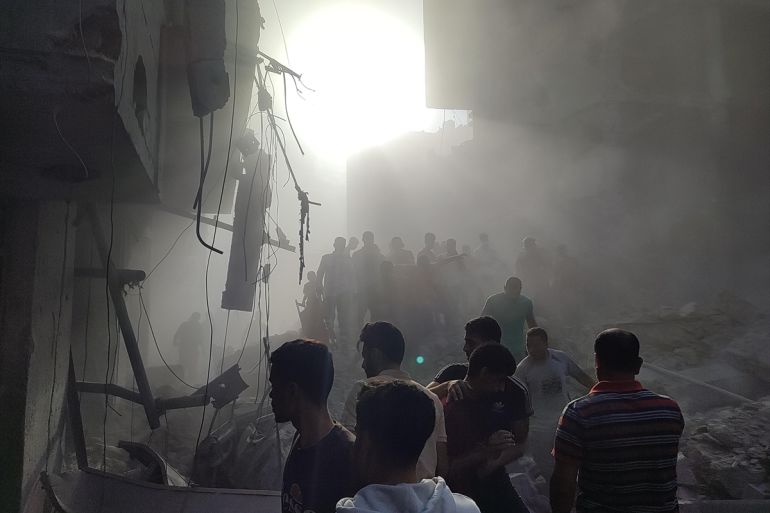‘Global silence and abandonment’ as Gaza’s Kamal Adwan Hospital destroyed
Northern Gaza’s last operational major health facility is being destroyed by Israeli forces.
Palestinians gather following an Israeli attack on the courtyard of Kamal Adwan Hospital in Beit Lahya, Gaza on December 25, 2024 [Khalil Ramzi Alkahlut/Anadolu]By Maram HumaidPublished On 30 Dec 202430 Dec 2024
The sound of tanks rumbling through the streets outside of Kamal Adwan Hospital woke everyone up, they were already on edge after enduring months of direct Israeli attacks.
Then came the loudspeakers ordering everyone to evacuate – the sick, the wounded, medical staff, and displaced people seeking shelter – early on Friday morning.
It was clear that the medical complex in northern Gaza’s Beit Lahiya was about to face an Israeli raid, like so many had before it as Israel seemed to systematically destroy all healthcare in Gaza.
It didn’t matter that, according to the World Health Organization, the hospital was the last major health facility operational in northern Gaza, an area that has been suffocatingly besieged and decimated by Israel in its ongoing war.
Nor that it was a refuge for hundreds of Palestinians whose homes had been destroyed by Israel and had nowhere else to go.
Numbers written on their chests
At about 6am, patient Izzat al-Aswad heard Israeli forces summoning Dr Hussam Abu Safia, the hospital director, over their loudspeakers.
Advertisement
Dr Abu Safia came back and told people in the hospital they had been ordered to evacuate. Abu Safia himself, who was a rare voice exposing what Israel was doing to the hospital, was taken by Israel, which has refused to release him despite calls to do so from the UN, humanitarian NGOs and international health organisations.
A little later, al-Aswad said Israeli soldiers demanded that all the men strip down to their underwear to be allowed to leave.
Shivering, frightened, many of them injured, the men were ordered to walk to a checkpoint the Israelis had set up about two hours away, al-Aswad recounted by phone.
At the checkpoint, they gave their full names and had their photographs taken.
Then a number was scrawled on their chest and neck by a soldier, indicating they had been searched.
Some of the men were taken for interrogation.
“They beat me and the men around me,” al-Aswad said. “They hit the injured people like me directly on our injuries.”
Izzat al-Aswad was beaten badly by Israeli soldiers who had made him strip down to his underwear. Shown on the Al-Ahli Arab Hospital premises where he sought shelter. [Karam Hassan/Al Jazeera]
Shorouq al-Rantisi, 30, a nurse in Kamal Adwan’s laboratory department, was among the women taken from the hospital.
The women were told to walk to the same checkpoint, which was in a school, and then waited for hours in the cold.
“We could hear the men being beaten and tortured. It was unbearable.”
Then the searches started.
“The soldiers were dragging the women by the head towards the search area,” al-Rantisi said. “[They] shouted at us, demanding we remove our headscarves. Those who refused were beaten badly.”
Advertisement
“The first girl called for searching was told to strip. When she refused, a soldier beat her and forced her to lift her clothes.
“A soldier dragged me by the head and then another soldier ordered me to lift the top of my clothes, then the bottom, and checked my ID,” she said.
Shrouq al-Rantisi, a laboratory nurse at the hospital, was dragged by the head to be interrogated by Israeli soldiers. Shown on the Al-Ahli Arab Hospital premises where she also sought shelter [Karam Hassan/Al Jazeera]
Abandoned patients
Al-Rantisi said the women were eventually taken, left at a roundabout, and told they could not go back to Beit Lahiya.
“How could we leave and abandon the patients? None of us ever thought of leaving until we were forced to,” she said on the phone.
Israel assaulted the hospital for many weeks before the raid.
“The hospital and its courtyard were bombed relentlessly, day and night, as if it was normal,” al-Aswad said.
“Quadcopters fired at anyone moving in the courtyard … they targeted generators and water tanks, while medical staff were struggling to care for patients.”
The night before the raid was “terrifying”, al-Aswad added, with Israeli attacks all around, including on the “al-Safeer” building.
“Witnesses say about 50 people were in there, including nurses from the hospital. No one could rescue them or retrieve their bodies, they’re still there,” he recounted.
Al-Aswad and the men who were not taken for interrogation were released after a full day of abuse and humiliation.
“The soldiers ordered us to go west of Gaza City and never come back,” he said. “We walked through destruction and rubble, freezing, until people came to meet us near Gaza City, offering help and blankets.”
Fadi al-Atawneh was injured, so he stayed behind in the hospital hoping for help that never came. Shown on the Al-Ahli Arab Hospital premises where he sought shelter [Karam Hassan/Al Jazeera]
‘Betrayed’ and ‘abandoned’
Israel’s raid merely compounded “the global silence and abandonment” Palestinians in Gaza have been faced with throughout more than a year of relentless Israeli attacks that killed more than 45,000 people, al-Rantisi said.
Advertisement
“Over 60 days of relentless shelling – quadcopters, artillery, and targeted strikes on generators,” she said.
“Dr Hussam’s pleas went unanswered until the hospital was stormed and emptied. How does the world allow this to happen?”
“I feel we were all betrayed,” Fadi al-Atawneh, 32, said bitterly on the phone.
“I was wounded, so I stayed in the hospital, hoping that the World Health Organization would evacuate or protect us, but it never happened,” al-Atawneh said.
“I am deeply saddened by what happened to us and the fate of Dr Abu Safia. We’re left alone in the face of this aggression.”
